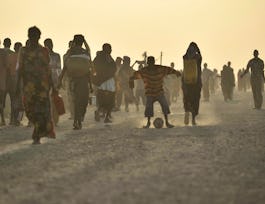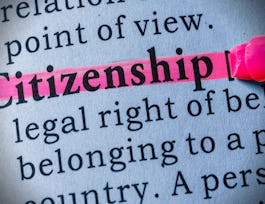This MOOC provides insight into the refugee phenomenon as one of the most complex, compelling and (arguably) misunderstood features of the 21st century. Taking a global perspective, it will outline the fundamentals of who ‘refugees’ are, where they come from and where they go, as well as delving into the features of the global system for refugee protection and ‘solutions’ for those who have been forcibly displaced. It places the student at the centre of the learning experience through engagement with a range of robust and challenging activities, materials and online peer engagement.


Refugees in the 21st Century
Taught in English
Some content may not be translated
23,130 already enrolled
(515 reviews)
Recommended experience
Skills you'll gain
- Practice sifting complex factual information to identify important features and trends
- Learn to apply technical legal and policy categories to a range of factual scenarios
- Learn to engage with technical concepts language and materials
- Practice navigating online in order to engage with specialised resources
- Practice evaluating on-the-ground problems to identify pertinent solutions
Details to know

Add to your LinkedIn profile
4 quizzes
See how employees at top companies are mastering in-demand skills


Earn a career certificate
Add this credential to your LinkedIn profile, resume, or CV
Share it on social media and in your performance review

There are 6 modules in this course
This MOOC provides insight into the refugee phenomenon as one of the most complex, compelling and (arguably) misunderstood features of the 21st century. Taking a global perspective, it will outline the fundamentals of who ‘refugees’ are, where they come from and where they go, as well as delving into the features of the global system for refugee protection and ‘solutions’ for those who have been forcibly displaced. It places the student at the centre of the learning experience through engagement with a range of robust and challenging activities, materials and online peer engagement. This course has been developed by the Refugee Law Initiative at the renowned School of Advanced Study of the University of London, one of the leading research institutions working on refugee protection and forced migration studies. Please review the Course Introduction video and activities and then proceed to our first weekly lesson: 'A world of refugees'.
What's included
2 videos5 readings1 quiz4 discussion prompts
This session addresses the paramount question of who is a refugee. The concept of a ‘refugee’ can be interpreted in several ways. The session shows that, alongside the ‘everyday’ meaning of the term, the global refugee regime established by the international community also uses a ‘specialised’ technical understanding of the term. The session asks you to think how that technical term might be applied by governments and others in practice to different situations when deciding who qualifies as a ‘refugee’ deserving protection by the international community.This week we will be looking to explore the following areas: key aspects of what we mean when we use the term ‘refugee’; comparisons between the technical definition of a ‘refugee’ and everyday use of this term; key features of the technical ‘refugee’ definition in the 1951 Refugee Convention, and; ‘asylum seeker’ as a non-technical term merely for persons seeking to have their refugee status recognised.
What's included
1 video1 reading1 quiz4 discussion prompts
In today’s world, there exists a ‘global system’ for responding to refugee arrivals. This session introduces you to two of the main features of this system: the 1951 Refugee Convention as the ‘cornerstone’ of refugee protection standards globally; and the Office of the United Nations High Commissioner for Refugees (UNHCR) as the global actor charged with the role of refugee protection by the international community. You are asked to reflect on the continuing relevance of this system, established in the middle of the 20th century, in the shifting contexts of the 21st century.This week we will be looking to explore the following areas: the global ‘system’ created by States for refugee protection; the main features of its legal ‘cornerstone’, the 1951 Refugee Convention, and; how the main institutional actor, UNHCR, fulfils its role in today’s world.
What's included
1 video1 reading1 peer review2 discussion prompts
With forced displacement at such high levels, a crucial component of the refugee protection regime is finding durable, long-lasting solutions for refugees and displaced persons. This session introduces you to the three core ‘durable solutions’ for refugees: voluntary repatriation, local integration and resettlement. You will examine the similarities and differences between these forms of durable solution, and the challenges that lack of solutions in practice pose for refugees around the world. This week we will be looking to explore the following areas: the concept of ‘solutions’ for refugees as the end of refugee status; the similarities and differences between the three main ‘durable solutions’ for refugees, and; the process and challenges of (lack of) solutions in a real-life case study.
What's included
1 video1 reading1 quiz3 discussion prompts
For a variety of reasons, some refugees move on from their first country or region of asylum to more geographically distant locations. Looking particularly at the European ‘crisis’ of 2015, this session explores the patterns and drivers of such refugee ‘mobility’ and how refugees undertaking these migratory journeys can get caught up in broader efforts to prevent or discourage irregular migration. This week we will be looking to explore the following areas: debates about the extent to which refugees are ‘migrants’; Government strategies to deter immigration and their impact on refugees, and; a case study of secondary movements and deterrence strategies.
What's included
1 video1 reading1 quiz3 discussion prompts
Refugees are not the only kind of forced migrants. Indeed, they represent only the tip of the iceberg so far as the wider universe of forced migrants in the 21st century is concerned. This session asks you to consider two of these other kinds of forced migrants lacking the protection of a State: stateless persons; and ‘internally displaced persons’ (IDPs). It focuses particularly on the similarities and differences between refugees and IDPs globally, including an assessment of the main protection challenges facing IDPs globally today. This week we will be looking to explore the following key areas: the wider range of forced migrants, including stateless persons, IDPs etc.; similarities and differences between refugees and conflict-IDPs globally, and; protection challenges in situations of internal displacement.
What's included
1 video1 reading1 peer review2 discussion prompts
Instructors


Offered by
Recommended if you're interested in Governance and Society

Johns Hopkins University

University of London

University of Colorado Boulder

University of Geneva
Why people choose Coursera for their career




Learner reviews
Showing 3 of 515
515 reviews
- 5 stars
83.10%
- 4 stars
15.53%
- 3 stars
0.97%
- 2 stars
0.38%
- 1 star
0%

Open new doors with Coursera Plus
Unlimited access to 7,000+ world-class courses, hands-on projects, and job-ready certificate programs - all included in your subscription
Advance your career with an online degree
Earn a degree from world-class universities - 100% online
Join over 3,400 global companies that choose Coursera for Business
Upskill your employees to excel in the digital economy
Frequently asked questions
Access to lectures and assignments depends on your type of enrollment. If you take a course in audit mode, you will be able to see most course materials for free. To access graded assignments and to earn a Certificate, you will need to purchase the Certificate experience, during or after your audit. If you don't see the audit option:
The course may not offer an audit option. You can try a Free Trial instead, or apply for Financial Aid.
The course may offer 'Full Course, No Certificate' instead. This option lets you see all course materials, submit required assessments, and get a final grade. This also means that you will not be able to purchase a Certificate experience.
When you purchase a Certificate you get access to all course materials, including graded assignments. Upon completing the course, your electronic Certificate will be added to your Accomplishments page - from there, you can print your Certificate or add it to your LinkedIn profile. If you only want to read and view the course content, you can audit the course for free.
You will be eligible for a full refund until two weeks after your payment date, or (for courses that have just launched) until two weeks after the first session of the course begins, whichever is later. You cannot receive a refund once you’ve earned a Course Certificate, even if you complete the course within the two-week refund period. See our full refund policy.


